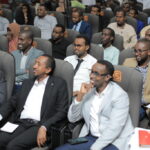
Iftin Foundation has presented yearly study on number of graduate students from the universities in Somalia in 2022.
02, August 2023
The Iftin Foundation has presented a yearly study on the students who graduated from the country’s universities in the year of 2022. It’s the 7th year that the Iftin Foundation has been conducting this study at universities across the Somalia. The study has reached 69 universities in 14 cities in Somalia, namely as Mogadishu, Baidoa, Bosaso, Garowe, Baladweyne, Hargeisa, Burco, Kismayo, Galkayo, Dhusamareb, Las’anod, Abudwaq, Jowhar and Marka.
The study noted that 25,230 students who obtained their first university degree in 2022, while the graduate number of 2021 was 20,250 student. The number of female graduates was 9,196 (36.54%) of the total, while the number of male graduates was 16,034 (63.46%) of the total. The study also showed that 29 colleges/faculties produced these graduates.
The data shows that the four colleges/faculties that produced the most students are:-
- Computer Science, IT and BIT that produced 3,136 students (12.43%) out of total.
- Nursing & Midwifery from 2,945 students (11.67%) out of total.
- Public Administration from 2,672 students (10.59%) out of total.
- Business Administration from 1,966 students (7.79%) out of the total.
While the four colleges/faculties that produced the least number of students were:-
- Aviation with 34 students (0.13%) out of a total.
- Statistics and Planning from 37 students (0.14%) out of a total.
- Social Science with 43 students (0.17%) out of a total.
- Marine and Maritime from 58 students (0.22%) out of the total.
The study analyzed how male and female graduates are differ in each college and it turned out that most of the girls/female graduated from the following four colleges:-
- Nursing & Midwifery (2,442 female)
- Public Health (892 female)
- Medical Laboratory (881 female)
- Public Administration (653 female)
While most of the male graduated from the following four colleges:-1. Computer Science & IT (2,602 male)2. Public Administration (2,019 male)3. Business Administration (1,406 male)4. Banking and Accounting (1,183 male )In this study report mentioned, how the cities of Somalia had produced the numbers of students who graduated from universities. Mogadishu is the city that produced the most graduates, that universities in Mogadishu produced 18,047 graduates (71.53%), followed by the city of Bosaso, which produced 3,560 students, equivalent to 14.11%, while the smallest city that produced the least number of students was the city of Lasa’anod, which graduated 8 students, equivalent to only 0.03%.Abdiwali Mohamed Ahmed, the Program Coordinator of Iftin Foundation has presented the study to the large audience and senior guests represent from government, civil society, international/national NGOs, civil society, private sector and university leaders. He discussed that the main purpose of this study is to find out the number of students who graduated from universities in the country, the knowledge they have learned, and the areas they have studied, the number of male and female graduates. This information also makes it easier to find out how the job opportunities in the country match with the number of graduates who are looking for a jobs.The event was attended by various dignitaries, who spoke on the spot and were include; 1. Abdulkadir Moalim Mohamed, Program Manager of Iftin Foundation.2. Mary Aden Amin, Director of Social Affairs in the Prime Minister’s Office.3. Ismail Yusuf Osman, Director of Higher Education of the Ministry of Education, Culture and Higher Education of the Federal Government of Somalia.4. MP Luul Ibrahim Omar, a member of the Somali People’s Assembly.5. Shafi’i Diriye Abdi, Vice President of SIU University.6. Yasin Mohamed Ibaar, Executive Director of the Somali Bankers Association.7. Abdullahi Moallim Ahmed (Sabah), senior member of Somali banks.8. Prof. Hussein Moallin Iman, one of the civil society leaders.On the other hand, the presentation of this study was accompanied a panel discussion by academics, private sector and government officials and has discussed the reasons that every year 4 colleges/fault produce most students, it was also discussed how to encourage students to choose with faculties that are beneficial for the economy and development of the country, such as Agriculture, Animal Husbandry and veterinary, Fisheries, Education and Statistics and Planning.









